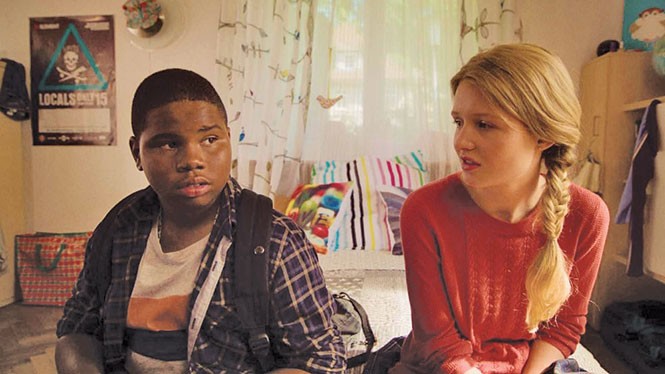
As you might recall from when it happened to you, or from the many movies you've seen on the subject, growing up is hard. That's especially true for kids with single parents, for minorities or kids living in a foreign country. The boy in Morris from America is all of those things, but don't expect a lot of high drama. This is a slight, pleasant coming-of-age comedy, offering smiles and warm fuzzies along with its two charming central performances.
Morris Gentry (Markees Christmas) is a stout, 13-year-old African American boy living with his dad, Curtis (Craig Robinson), in Heidelberg, Germany—a city not known for its ethnic diversity. Curtis, a former professional soccer player from New York, has taken a job on a German team's coaching staff, uprooting Morris from their home. (It's just the two of them since Mom died.) Morris takes German lessons from a college student named Inka (Carla Juri), and he communicates well enough with his peers (who tend to speak English), but he hasn't made much effort to make friends here. He and his pop mostly just hang out together, listening to old-school hip-hop.
As a dad, Curtis walks the line between being a good, responsible father and being Morris' pal. He generally comes down on the right side of it, and their spirited, loving, expletive-laced relationship is the heart of the film. When Inka finds a notebook in which Morris has transcribed some profane rap lyrics, Curtis isn't bothered by the sexuality or the misogyny so much as the fact that Morris isn't writing from his own experiences. Earlier, Curtis had grounded Morris for having poor taste in hip-hop, then un-grounded him five minutes later because he was bored.
What makes Morris start to interact with the German kids is, of course, a girl. Katrin (Lina Keller) is a wispy, trouble-seeking 15-year-old blonde who takes an amused, flirtatious interest in Morris, which Morris interprets as romance. He falls in with Katrin's crew at the youth recreation center, a bunch of snotty, privileged mid-teens who call him "Kobe Bryant" until they find out he doesn't play basketball.
All of them, Katrin included, see Morris as something of a novelty, and not just because he's from America. But the movie rarely mentions race directly (though one notable exception is an uncomfortable scene in which Katrin asks whether certain stereotypes are true). It's mostly insinuations, like an administrator going straight to Morris when he finds the remains of a joint behind the school. How does being black affect the already difficult experience of being a 13-year-old boy in a strange land? The movie—written and directed by Chad Hartigan, who is not black—seems reluctant to get into it, but unable to completely ignore it. I can sympathize.
Anyway, it's not the point. Hartigan, whose fondly received This Is Martin Bonner premiered at Sundance 2013, has a way with likable, unassuming characters, and what he's really interested in here is the father-and-son dynamic. Newcomer Markees Christmas is a real find as Morris, giving a natural, all-too-relatable performance as a boy who's trying to grow up as fast as he can. His explicit rap lyrics notwithstanding, Morris is an innocent babe. He pores over a nudie magazine that he finds, but doesn't know what to do with it. When he puts Katrin's sweater on a pillow and pretends it's her, the moment is sort of adorably naughty, rather than dirty. Christmas plays the role with a believable mix of innocence, frustration and curiosity.
Craig Robinson—a familiar, funny actor from The Office and Hot Tub Time Machine—does breakout work as Curtis Gentry, adding a dramatic, emotional layer to what we've seen him do before. He and Christmas have a satisfying chemistry; more importantly, they ring true as one of the infinite variations of the parent-child model.
While Morris From America is nice and amenable, it's also completely insubstantial. The insights and character arcs are small. You'll laugh, you'll smile, you'll have a good time, but in a week you'll forget you ever saw it. So enjoy it while it lasts.